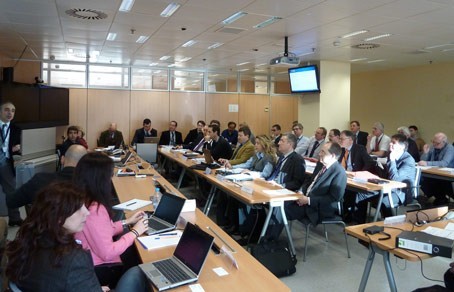The business case study of the divertor remote handling system is unveiled


One of the most fascinating technologies linked to the operation of the ITER machine is remote handling. The millimetric accuracy required for the inspection and replacement of large multi-tonne components need sophisticated tooling able to perform remote maintenance.
On 5 February, F4E’s Remote Handling Project Team with its designated procurement officers, organised a one-day event to pre-selected candidate bidders in order to present the key aspects of the tendering process behind the multiple Framework contracts of the divertor remote handling system- the so-called ‘business case” that competing industries will have to perform. The meeting took place in Barcelona and brought together 30 representatives from the four candidate bidders, grouped in consortia led by: Assystem UK Ltd (UK).; Astrium GmbH and Areva NP GmbH (Germany); Amec Nuclear UK Ltd (UK); Telstar Technologies S.L.U. (Spain).
Carlo Damiani, Project Team Leader for Remote Handling, explained that the procurement of remote handling systems for the divertor requires a novel combination of nuclear niche technologies with a considerable amount of engineering and foresees a major role for the European industry. “F4E is willing to define the best possible long term partnership with industry. Therefore, we have developed with great attention the business case that we are proposing today to the four industrial consortia that have responded to our call for expression of interest and have been selected for our tendering phase”.
Through this business case study F4E will ask the different consortia to demonstrate how their technical and managerial capabilities will be put to use in a concrete manner. The score of the business case study will be one of the key elements of the tender evaluation procedure. By all means, this is a turning point for the different consortia because through this exercise they will be pushed to think out of the box, demonstrate their competences and potential as big technology players. In order to support bidders in this competitive dialogue, F4E will offer financial support to those business case studies that receive a score above the evaluation threshold.
As far as the remaining three packages of remote handling are concerned, they will be carried out in the same way and it is expected that this area of technology will offer new opportunities to the different interested industries.
To see the agenda of the meeting click here.